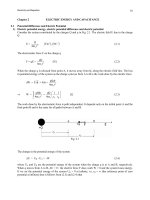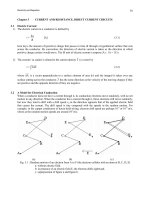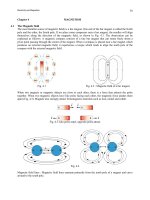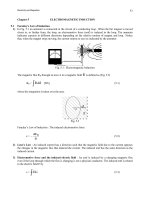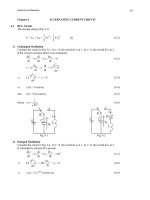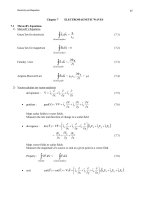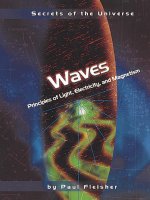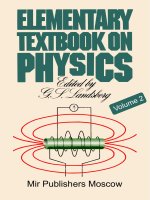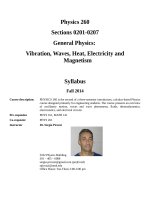General Physics Vibration, Waves, Heat, Electricity and Magnetism
Bạn đang xem bản rút gọn của tài liệu. Xem và tải ngay bản đầy đủ của tài liệu tại đây (265.92 KB, 7 trang )
Physics 260
Sections 0201-0207
General Physics:
Vibration, Waves, Heat, Electricity and
Magnetism
Syllabus
Fall 2014
Course description:
PHYSICS 260 is the second of a three-semester introductory, calculus-based Physics
course designed primarily for engineering students. The course presents an overview
of oscillatory motion, waves and wave phenomena, fluids, thermodynamics,
electrostatics, and electrical circuits.
Pre-requisites
PHYS 161, MATH 141
Co-requisite:
PHYS 261
Instructor
Dr. Sergio Picozzi
3102 Physics Building
301 – 405 – 6088
(preferred)
Office Hours: Tue-Thurs 2:00-3:00 pm
Lecture Times and
Location
Mon-Wed 3:00 – 4:15pm, PHY 1412
Discussion Sessions
Discussion sessions will be conducted by the Teaching Assistants, and consist in a
forum where students can ask questions about the course material and where
problems will be worked out with student participation.
Teaching Assistants:
Monica Gutierrez Galan
Shih-Han Hung
Hwan Mun Kim
For schedules and venues of discussion sessions please consult TESTUDO.
Textbook
Required: Physics for scientists and engineers, 3rd edition Volumes 1, 2, 3, 4,
by Randall D. Knight (Addison-Wesley/Pearson). This textbook is also available as a
single-volume hardcover.
In addition to the textbook, you will need a copy of the “Physics 261 Laboratories”
manual, which is a University of Maryland custom book published by Wiley.
Note: if you want to buy a used copy of this, it must not have been written in!
To summarize: the required materials for PHYS 260/261 are the textbook, and the
labs manual.
Lectures
Students are required to attend lectures, where the course material will be presented
and exams will be administered.
Years of experience have convinced me that the most effective way to teach
introductory physics is by working out in full detail problems from the textbook
(or from other sources, when available) in front of the class. Concepts and
principles will emerge and will be elucidated along the way while solutions are
worked out. In a nutshell, my approach consists in “teaching by doing”.
Preparation
Students are responsible for all material covered in lectures. It is the students’
responsibility to record accurately and to be aware of the specific lectures’ contents.
This is one of the reasons why attendance is necessary.
Laboratory
(PHYS 261)
See Lab Schedule chart-PHY 3219
Lab includes experiments on mechanics, vibrations, waves, heat, electricity and
magnetism. PHYS260 and PHYS261 (lab) must be taken in the same semester and
the grade for the courses will be combined into a single grade for both. To pass,
students must complete passing work in both PHYS260 and PHYS261.
Homework
Homework will be done through Mastering Physics. Problems will be assigned
from the text by the instructor.
You must submit your answers for the homework problems over the internet using the
Mastering Physics web site (see below).
There are several advantages to electronic homework submission:
(1) You will know right away if your answer is right or wrong
(2) If you give a wrong answer, you can go back and try again to see if you can get the
correct solution.
(3) You are graded only on your final answers and get your score when you are done.
(4) The site also has a tutorial capability that you may find helpful.
Note that the software may randomize the numbers each time you make a new attempt
on a problem, so be careful and remember that other students working on exactly the
same problems are likely to have different numbers.
Why You Need to do the Homework: The principal way that you can understand
Physics is by learning how to solve problems. The homework can be expected to be
challenging, it counts a great deal towards your final grade and it enables you to succeed
on your exams.
Getting started in electronic homework submission: To turn in your homework, you
need to go to:
/>The site is best accessed with a current version of Windows Explorer or Firefox. If you
run into problems, check the system requirements. In the past, there have been major
issues working with Mastering Physics through Google Chrome, so please avoid using
Google Chrome.
Registering and Gaining Access to Mastering Physics: In order to turn in your
homework, you will need to register at the Mastering Physics website
To register, you need two things - an access number
and the class ID. When you buy (new or used copy of) your textbook you will
need to purchase a Mastering Physics access key number. The easy way to do
this is to simply buy it on line from the above MP website.
Your class ID is: MPPICOZZI921216
Exams
There will be three in-class midterm exams plus one cumulative final exam.
All exams are closed-book and closed-notes. On exam day, bring a pocket calculator
(graphing calculators are strongly discouraged) and writing tools (pens or pencils).
Paper will be provided.
Moreover, you should prepare and bring a formula sheet containing only
equations and values of fundamental constants, but no problem solutions.
Late Submissions and Turning in late homework is not allowed under any circumstances. Assignments
Make-ups
will be given well in advance of the due date, so that it is in your interest not to wait
until the last day to work on them, thereby avoiding that inescapable commitments or
unforeseen emergencies could prevent you from submitting your work on time.
The lowest of three scores in the midterm exams will be dropped. No make-ups will
be given under any circumstances. If you happen to miss one exam, due to illness or
any other reason, that is the score that will be dropped. You must take the final
exam in order to pass this course.
Final Grade
The semester grade is based on the LECTURE/DISCUSSION (75%), PHYS
260, and the LAB (25%), PHYS 261. A passing grade must be earned in both
PHYS 260 and PHYS 261 to receive a single passing grade in the course.
Course grade break-down:
15%
Homework
40%
Midterm exams (20% each of two)
20%
Final exam
25%
Labs (PHYS 261)
The final grade will be set at the end of the semester after all work is completed. In
assigning the final grade, I will be following the University of Maryland’s grading
policy, quoted below:
A denotes excellent mastery of the subject and outstanding
scholarship. (90-100)
B denotes good mastery of the subject and good scholarship. (80-89)
C denotes acceptable mastery of the subject and the usual
achievement expected. (70-79)
D denotes borderline understanding of the subject. It denotes
marginal performance, and it does not represent satisfactory progress
toward a degree. (60-69)
F denotes failure to understand the subject and unsatisfactory
performance. ( < 60 )
Students with
disabilities
Accommodations will be provided to enable students with documented disabilities to
participate fully in the course. Please discuss any needs with the instructor at the
beginning of the semester so that appropriate arrangements can be made. Students
who are registered with DSS, and who are planning to take examinations at DSS
facilities, are required to let me have the pertinent authorization forms in editable
electronic format at least one week prior to each exam date.
University Closure
In the event of a University Closure the department will do its best to accommodate
students by scheduling make-up sessions or revision of the lab schedule.
Academic Integrity
All students will be expected to comply with the University of Maryland's academic
integrity policies, including the code of academic integrity and the honor pledge.
Failure to comply will result in a failing grade and will be reported to the Honor
Council.
Physics 260 Sections 0201-0207
Course Schedule
Fall 2014 --- Prof. Sergio Picozzi
Week Beginning:
In Class Activities:
Sep 1
Sep 8
Sep 15
Sep 22
Sep 29
Chapter 16
Chapters 16-17
Chapters 17-18
Chapters 18-19
Chapter 19
Midterm 1
Chapter 15
Chapters 15-14
Chapters 14-20
Chapters 20-21
Chapter 21
Midterm 2
Chapters 25-26
Chapters 26-27
Chapters 27-28
Chapters 29-30
Chapter 31
Midterm 3
Oct 1
Oct 6
Oct 13
Oct 20
Oct 27
Nov 3
Nov 5
Nov 10
Nov 17
Nov 24
Dec 1
Dec 10
Dec 10
Examination Schedule
Midterm 1: Wednesday 1 October, Chapters 16 through 19
Midterm 2: Wednesday 5 Nov, Chapters 15-14-20-21
Midterm 3: Wednesday 10 Dec, Chapters 25 through 31
Final Exam: Tuesday 16 Dec, 6:30-8:30 pm, Cumulative
Dear Student:
In this course you will be using MasteringPhysics®, an online tutorial and homework program that
accompanies your textbook. If you have joined a MasteringPhysics course before and can still log in:
Save time by following the guide for joining another course by following the guide for joining another
course (available from www.masteringphysics.com > Tours & Training > Getting Started) instead of
this page.
What You Need:
A valid email address
A student access code
(Comes in the Student Access Code Card/Kit that may have been packaged with your new
textbook or that may be available separately in your school’s bookstore. Otherwise, you can
purchase access online at www.masteringphysics.com.)
The ZIP or other postal code for your school: _______________
A Course ID: _ MPPICOZZI921216 __(Provided by your instructor)
1. Register
Go to www.masteringphysics.com and click Students under Register.
To register using the student access code inside the MasteringPhysics Student Access Code
Card/Kit, select Yes, I have an access code. Click Continue.
–OR– Purchase access online: Select No, I need to purchase access online now. Select your
textbook, whether you want access to the eText, and click Continue. Follow the on-screen
instructions to purchase access using a credit card. The purchase path includes registration, but
the process is a bit different from the steps printed here.
License Agreement and Privacy Policy: Click I Accept to indicate that you have read and agree
to the license agreement and privacy policy.
Select the appropriate option under “Do you have a Pearson Education account?” Continue to give
the requested information until you complete the process. The Confirmation & Summary page
confirms your registration. This information will also be emailed to you for your records. You can
either click Log In Now or return to www.masteringphysics.com later.
2. Log In
Go to www.masteringphysics.com.
Enter your Login Name and Password that you specified during registration and click Log In.
3. Join Your Instructor’s Online Course and/or Open Self-Study Resources
Upon first login, you’ll be asked to do one or more of the following:
Join a Course by entering the MasteringPhysics Course ID provided by your instructor. If you
don’t have a Course ID now, you can return to join the MasteringPhysics course later. When you
join a course, you may also be asked for a Student ID (follow on-screen instructions).
Explore the Study Area or Launch Your eText, if these resources are available for your textbook.
To Access MasteringPhysics Again Later
Simply go to www.masteringphysics.com, enter your Login Name and Password, and click Log In.
After you have joined a course: You can open any assignments from the Assignments Due Soon area or
from the Assignments page. For self-study, click eText or Study Area, if these options are available.
Support
Access Customer Support at www.masteringphysics.com/support, where you will find:
System Requirements
Answers to Frequently Asked Questions
Registration Tips & Tricks video
Additional contact information for Customer Support, including Live Chat

